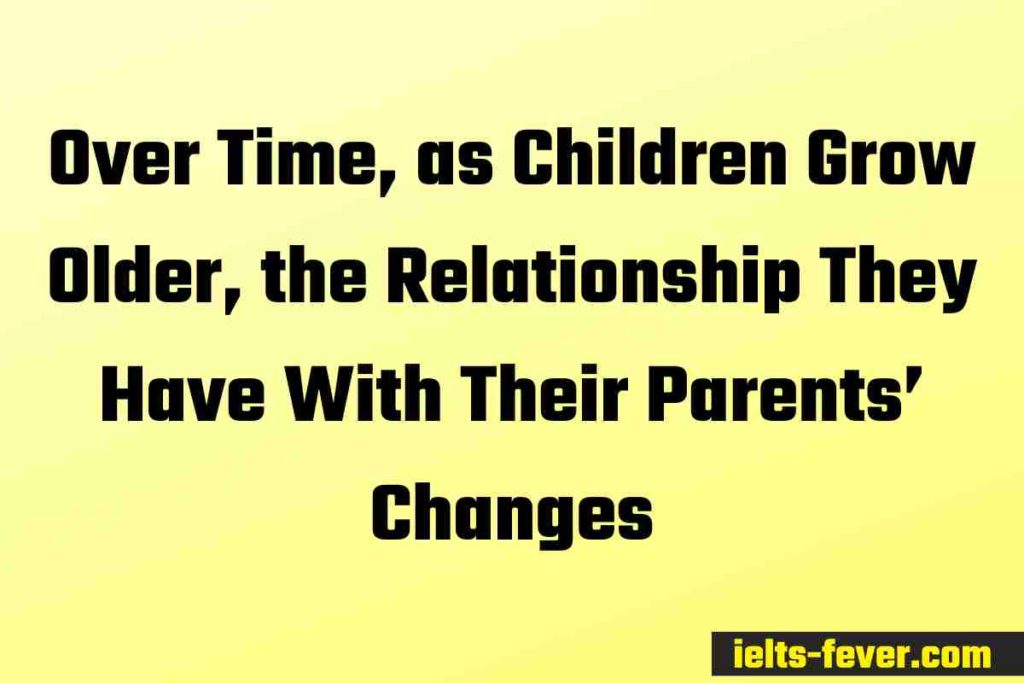Over Time, as Children Grow Older, the Relationship They Have With Their Parents’ Changes. In your opinion, what role should parents have in their adult children’s lives? Give reasons for your answer and include any relevant examples from your own knowledge or experience.
Sample 1 Over Time, as Children Grow Older, the Relationship They Have With Their Parents’ Changes
In my opinion, as children grow older and transition into adulthood, the role of parents in their lives should evolve from being authoritative figures to becoming supportive and advisory pillars. Parents should continue to play a crucial part in their adult children’s lives, but with an understanding of their children’s autonomy and independence. There are several reasons why I believe this is the ideal approach.
First and foremost, it is essential to acknowledge that as children mature, they develop their own unique set of values, beliefs, and aspirations. By assuming a supportive role, parents can demonstrate respect for their adult children’s individuality and decision-making abilities. This fosters a sense of trust and open communication between both parties, which is crucial for maintaining a healthy relationship in the long run.
Secondly, parents possess a wealth of experience and knowledge that can be invaluable for their adult children as they navigate the complexities of life. By offering guidance and advice when needed or sought, parents can help their children make well-informed decisions and avoid potential pitfalls. For instance, a parent who has successfully managed a household budget can share tips on financial planning and savings with their adult child, who may be starting their own family.
Lastly, it is essential for parents to maintain an emotional connection with their adult children. Life is filled with challenges and uncertainties, and having a strong support system is vital for one’s well-being. Parents should be available to listen, empathize, and offer encouragement during difficult times. Sharing personal experiences and how they overcame adversities can provide their children with valuable insights and boost their resilience.
In conclusion, the role of parents in their adult children’s lives should be supportive, advisory, and emotionally nurturing. This approach respects the autonomy of adult children while also offering them the benefit of their parents’ experience and wisdom. Ultimately, maintaining a healthy balance between involvement and independence in the parent-child relationship is crucial for the well-being and happiness of both parties.
Sample 2 Over Time, as Children Grow Older, the Relationship They Have With Their Parents’ Changes
In my opinion, as children transition into adulthood, the role of parents should adapt to become more of a supportive and advisory presence, rather than an authoritative one. This change allows adult children to exercise their independence while still benefiting from their parents’ guidance and experience. There are several reasons why I believe this approach is most effective.
Firstly, acknowledging that adult children have developed their own set of values, beliefs, and ambitions is crucial. By adopting a supportive role, parents demonstrate respect for their children’s individuality and decision-making abilities. This cultivates a sense of trust and open communication, which is vital for maintaining a healthy relationship over time.
Secondly, parents possess a wealth of knowledge and experience that can be invaluable for their adult children as they navigate life’s complexities. Offering guidance and advice when needed or requested allows children to make well-informed decisions and learn from their parents’ past experiences. For example, a parent who has navigated career challenges can offer practical advice and support when their adult child is faced with similar situations.
Lastly, it is essential for parents to maintain an emotional connection with their adult children. Life presents various challenges and uncertainties, and having a strong support system is crucial for one’s well-being. Parents should be available to listen, empathize, and offer encouragement during difficult times. Sharing personal experiences and the lessons they learned can provide valuable insights and strengthen the bond between parent and child.
In conclusion, parents should assume a supportive, advisory, and emotionally nurturing role in their adult children’s lives. This approach respects their children’s autonomy while offering the benefits of parental wisdom and experience. Ultimately, striking a balance between involvement and independence in the parent-child relationship is essential for the well-being and happiness of both parties.
Follow us on Facebook

